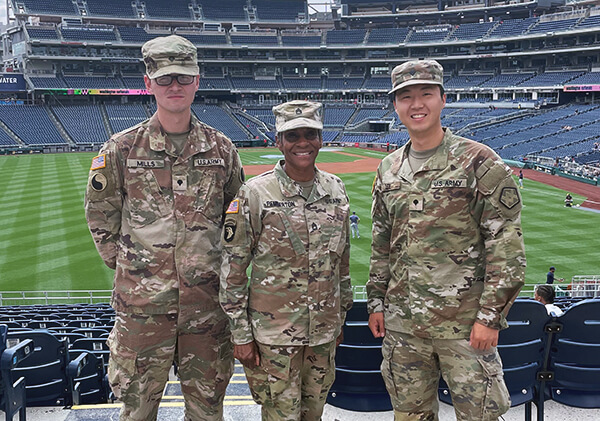Army reservist Sgt. Wang Geun Lee had a plan for his future that he knew would expand and grow with time.
“In my second year of college, I wanted to do something more meaningful to help change the community, so that’s why I joined the Army Reserve. I want to serve the nation,” said Lee.
That plan had a bit of a wrench thrown in it while deployed to Kuwait.
“I was training and tore up my knee getting out of a vehicle in September 2022. I ended up getting medevacked because of the severity of my injury to Fort Cavazos, and I was then sent to the Fort Belvoir Soldier Recovery Unit (SRU) for further treatment.”
The financial management specialist tore his left ACL and needed surgery, which he had in January of 2023.
“I was on crutches for 10 weeks, then I had intense physical therapy for about six months. It took me 10 months to get well. The SRU helped me to make appointments with physical therapy and docs; they also helped on the administrative side, and they follow through with the intent of helping me return to duty which I am happy to say I am returning to duty!”
He is most thankful for the Army Recovery Care Program and how they worked with him on his recovery journey.
“They really helped me out by having me go to the Fort Belvoir SRU because it’s closer to my home of Fort Washington, Maryland, so that I could have the support of my family and friends.”
Like many soldiers, Lee was floored to learn his only job was to get better.
“I had no idea what an SRU was or what the program was. I assumed I would be on convalescent leave and would have to use TRICARE and go through surgery and physical therapy on my own. I was very fortunate to learn about this excellent program, which is also helping me navigate through my post-injury recovery. They are always checking on me to see how I am doing and if I need anything,” said Lee.
“It would have been a lot of headaches if I had to do this on my own. My sole focus is getting better and getting back to duty. I definitely would have been more stressed out. Besides the medical side, the SRU has a lot of events to help in your recovery. I was able to participate in a horse therapy program, something I never would have done. It definitely helps treat the mental side of my recovery.”
Lee is pleased about the accommodation made for his immediate future by the Fort Belvoir SRU.
“I am a full-time student at Virginia Tech when I am not pulling reserve duty. I am back in school, and the SRU worked with me to switch back and forth between school and the SRU. Three days a week, I am in Blacksburg pursuing my degree in mechanical engineering, and the rest of the week, I do my therapy at the SRU.”
He says he enjoyed his time at Fort Belvoir and knows how fortunate he is to be able to heal physically and mentally while still achieving his education goals.
“I will graduate this May and work full-time as a mechanical engineer. I want other soldiers who could need the SRU to know, to take advantage of your Transition Coordinator at the SRU. Mine is Mr. James Coleman who really encouraged me to take resume writing classes at Fort Belvoir and always made sure I knew about career fairs to help me transition back into civilian life. I even got an internship opportunity! There is no sitting in the barracks at the Fort Belvoir SRU; they want you to recover and overcome!”
Lee also appreciates the relationships built at the SRU, which he says are most helpful in getting back in the game.
“The other soldiers are in the same boat as far as recovery and treatment. Everyone has a story, and the cadre is very compassionate in helping you recover. Being with likeminded soldiers also helped me push my limits, and we got better together.”

